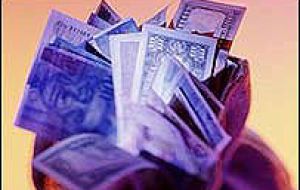MercoPress. South Atlantic News Agency
The Economist forecasts Mrs Kirchner will be Argentina's next president

Under the title “Corruption in Argentina; More brouhaha for the government” the prestigious British magazine The Economist publishes a thrashing report about the current political situation in Argentina and the Kirchners future.
The article from the Economist Intelligence Unit questions the money package incident involving Economy Minister Felicia Micel, recent allegations of corruption and the growing problems triggered by inflation and the energy crisis. But despite the corruption cases and other problems along with the debilitated state of the opposition, The Economist forecasts "there is little doubt that Mrs Kirchner will win the coming October presidential election". But "what is also without doubt is that she will inherit a host of difficulties and may well have a tougher time of it than her husband". Some excerpts of the article: Following a string of recent corruption allegations, the administration of President Néstor Kirchner is being hit with a new brouhaha surrounding his economy minister, Felisa Miceli. The case could damage Mr Kirchner's image by adding to a growing perception that corruption runs deep in his government. Ms Miceli may ultimately be sacrificed. However, the incident will have little if any effect on economic policy, which is largely run directly by the president and his inner circle. Nor is it likely to undermine his wife's prospects in the October 28th presidential elections. Accusations of irregularities and payoffs, particularly in public-works and other government contracts, have been made since 2005, but only in recent months have they been accompanied by evidence. The case of a large natural-gas pipeline project, which surfaced in March, may involve as much as US$25m in illegal payments to government officials, according to opposition politicians and a judge. At least one foreign company, Sweden's Skanska, has been implicated. Revelations about this scandal may have been a factor in convincing Mr Kirchner not to run for re-election and to hand the candidacy of his party, Partido Justicialista (Peronist party), to his wife, Cristina Fernández de Kirchner. Mrs Kirchner is a powerful and popular politician in her own right, representing the province of Buenos Aires in the Senate. Now his economy minister is under scrutiny, after fire inspectors, during a routine security check, reportedly found US$240,000 in cash (Mrs Miceli now says it was US$64,000) in her private office bathroom. Although she claims her brother loaned her the funds for a real estate purchase that fell through, the affair smacks of impropriety and is now under investigation by the legislative and judicial branches of government. Mr Kirchner has so far stuck by his minister and says he believes her explanations. But pressure to sack her will grow, and there is already speculation as to whom he might choose to replace her. Whoever it is, economic policyâ€"characterised by a heterodox mix including price controls, maintenance of a weak currency and interventionist measuresâ€"is unlikely to change, and certainly not before the October elections. Any significant adjustments to policy will probably not occur until after the next president takes office in 2008. Corruption scandals are not the only troubles marring the electoral landscape. The Kirchner administration has struggled to contain inflation, and has been accused of manipulating price data in order to hide the full extent of the problem. Indeed, while official data points to annual inflation running at around 9%, criticsâ€"including Mr Kirchner's former economy minister and now opposition presidential candidate Roberto Lavagnaâ€"claim it is really around 15%. Mr Kirchner has avoided taking politically difficult decisions to rein in inflation, such as raising interests rates or other moves to stem strong domestic demand and slow the fast pace of economic growth (running in excess of 8% in the first quarter of 2007, after four consecutive years of growth averaging 9%). Instead, he has opted to impose price pacts and export taxes, maintain a freeze on utilities tariffs, and apply other quick, but unsustainable, fixes. Argentina is also being hit with energy shortages with the particularly harsh start of the southern hemisphere winter. Energy security has been a cause for concern for the private sector for some time, and the government has now begun to ration natural gas to factories and to arrange for electricity purchases from neighboring Brazil. Ongoing problems in the power sector will not only fuel popular dissatisfaction, they will also worsen inflationary pressures. On the political front, Mr Kirchner saw key allies lose important elections at the end of June. The governorship of Tierra del Fuego province went to an opposition candidate from a centre-left party. The mayorship of Buenos Aires, the capital, was won by Mauricio Macri, a conservative politician and wealthy businessman who is also one of the president's main political rivals. In this more challenging political climate, the choice of Mrs Kirchner as presidential candidate was designed to provide a fresh face without a major alteration in policyâ€"change with continuity. Given the strong popularity ratings for both Kirchnersâ€"despite the corruption cases and other problemsâ€"along with the debilitated state of the opposition, there is little doubt that Mrs Kirchner will win the election. What is also without doubt is that she will inherit a host of difficulties and may well have a tougher time of it than her husband.




Top Comments
Disclaimer & comment rulesCommenting for this story is now closed.
If you have a Facebook account, become a fan and comment on our Facebook Page!